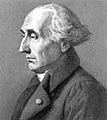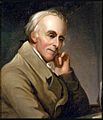1813 facts for kids
| Millennium: | 2nd millennium |
|---|---|
| Centuries: | 18th century – 19th century – 20th century |
| Decades: | 1780s 1790s 1800s – 1810s – 1820s 1830s 1840s |
| Years: | 1810 1811 1812 – 1813 – 1814 1815 1816 |
| Gregorian calendar | 1813 MDCCCXIII |
| Ab urbe condita | 2566 |
| Armenian calendar | 1262 ԹՎ ՌՄԿԲ |
| Assyrian calendar | 6563 |
| Balinese saka calendar | 1734–1735 |
| Bengali calendar | 1220 |
| Berber calendar | 2763 |
| British Regnal year | 53 Geo. 3 – 54 Geo. 3 |
| Buddhist calendar | 2357 |
| Burmese calendar | 1175 |
| Byzantine calendar | 7321–7322 |
| Chinese calendar | 壬申年 (Water Monkey) 4509 or 4449 — to — 癸酉年 (Water Rooster) 4510 or 4450 |
| Coptic calendar | 1529–1530 |
| Discordian calendar | 2979 |
| Ethiopian calendar | 1805–1806 |
| Hebrew calendar | 5573–5574 |
| Hindu calendars | |
| - Vikram Samvat | 1869–1870 |
| - Shaka Samvat | 1734–1735 |
| - Kali Yuga | 4913–4914 |
| Holocene calendar | 11813 |
| Igbo calendar | 813–814 |
| Iranian calendar | 1191–1192 |
| Islamic calendar | 1227–1229 |
| Japanese calendar | Bunka 10 (文化10年) |
| Javanese calendar | 1739–1740 |
| Julian calendar | Gregorian minus 12 days |
| Korean calendar | 4146 |
| Minguo calendar | 99 before ROC 民前99年 |
| Nanakshahi calendar | 345 |
| Thai solar calendar | 2355–2356 |
| Tibetan calendar | 阳水猴年 (male Water-Monkey) 1939 or 1558 or 786 — to — 阴水鸡年 (female Water-Rooster) 1940 or 1559 or 787 |
The year 1813 (written as MDCCCXIII in Roman numerals) started on a Friday in the Gregorian calendar. It was a busy year with important events happening around the world, especially during the Napoleonic Wars and the War of 1812.
Contents
Big Events of 1813
January to March
- February 11 – At Fort Meigs, Major Amos Stoddard took command of the fort.
- February 26 – The Secretary of War asked Colonel R. M. Johnson to get a group of volunteer soldiers ready. They would serve for 4 to 6 months.
- Late February – General Harrison tried to burn British ships at Malden. He planned to cross Lake Erie on sleighs, but the ice was not strong enough, so they had to turn back.
- March 22 – Colonel R. M. Johnson ordered the creation of a group of mounted (horseback) volunteers in Kentucky.
April to June
- April 8 – Colonel James Ball arrived at Fort Meigs with 200 dragoons, who were soldiers on horseback.
- April 27 – During the War of 1812, United States troops attacked and destroyed parts of York (which is now Toronto, Ontario). York was the capital of Ontario at the time.
- May 2 – The famous French leader Napoleon won the Battle of Lützen.
- May 11 – Explorers Gregory Blaxland, William Lawson, and William Wentworh began an important journey. They set out to cross the Blue Mountains in Australia.
- May 20-May 21 – Napoleon won another battle, the Battle of Bautzen.
- May 27 – In Canada, forces from the United States captured Fort George.
- June 6 – During the War of 1812, the Battle of Stoney Creek took place. A British force of 700 soldiers defeated an American force that was three times larger! On the same day, the explorers Gregory Blaxland, William Lawson, and William Wentworh successfully crossed the Blue Mountains and returned home.
- June 21 – The Peninsular War ended with the Battle of Vitoria. A large army of British, Spanish, and Portuguese soldiers, led by Wellington, defeated the French army led by Joseph Bonaparte.
July to September
- July 5 – The War of 1812 saw British raids begin on places like Fort Schlosser, Black Rock, and Plattsburgh, New York. These raids lasted for three weeks.
- July 13 – Missionaries Adoniram Judson and his wife Ann Hasseltine Judson arrived in Burma (which is now called Myanmar).
- August 19 – Gervasio Antonio de Posadas joined Argentina's government, which was ruled by three people.
- August 23 – The Battle of Großbeeren happened.
- August 26 – The Battle of the Katzbach took place.
- August 26-August 27 – Napoleon won the Battle of Dresden.
- August 29-August 30 – Napoleon's troops were defeated at the Battle of Kulm.
- September – Robert Southey became the Poet Laureate of Britain. This is a special title for a poet who writes poems for national events.
- September 6 – The Battle of Dennewitz occurred.
- September 10 – In the War of 1812, Oliver Hazard Perry led the American fleet to victory over a British fleet in the important Battle of Lake Erie.
October to December
- October 5 – During the War of 1812, William Henry Harrison defeated the British at the Battle of the Thames. Sadly, the famous Native American leader Tecumseh was killed in this battle.
- October 14 – In Caracas, Venezuela, Simón Bolívar was given the special title of El Libertador, meaning "The Liberator."
- October 16-October 19 – Napoleon faced a major defeat at the Battle of Leipzig.
- October 24-November 5 – Persia and Russia signed the Treaty of Gulistan. This treaty ended the first Russo-Persian Wars (1804-1813). As a result, Persia lost all its lands north of the Aras River to the Russians.
- October 25 – In the War of 1812, Charles de Salaberry defeated an American invasion at the Battle of the Chateauguay.
- November 11 – During the War of 1812, the Americans were defeated at the Battle of Crysler's Farm.
- November 21 – The Netherlands became an independent country again.
- December 29 – In the War of 1812, British soldiers burned the city of Buffalo, New York.
Other Events of the Year
- Russian troops entered and took control of Berlin without a fight. The French soldiers had already left the city.
- Mathieu Orfila published his important book Trait des poisons. This book helped create the study of toxicology, which is about poisons.
- George Hamilton-Gordon worked as an ambassador (a country's representative) in Vienna.
- After his father Wossen Seged died, Sahle Selassie became the Meridazmach (a ruler) of Shewa.
- The Philomathean Society was started at the University of Pennsylvania. It is the oldest student literary society in the United States.
Ongoing Conflicts
- The Napoleonic Wars (which lasted from 1799 to 1815) continued, including the Peninsular War and the War of the Sixth Coalition.
- The War of 1812 (which lasted from 1812 to 1815) was also ongoing.
People Born in 1813
Many important people were born in 1813, including:
- January 19 – Sir Henry Bessemer, an English inventor.
- January 21 – John C. Frémont, an American soldier and explorer.
- January 26 – Juan Pablo Duarte, who helped found the Dominican Republic.
- March 19 – David Livingstone, a famous Scottish missionary and explorer.
- April 23 – Stephen A. Douglas, a U.S. Senator and presidential candidate.
- May 5 – Soren Kierkegaard, a Danish philosopher.
- May 22 – Richard Wagner, a famous German composer.
- June 24 – Henry Ward Beecher, an American clergyman and reformer.
- October 10 – Giuseppe Verdi, a very famous Italian composer.
People Who Died in 1813
Some notable people who passed away in 1813 include:
- January 20 – Christoph Martin Wieland, a German writer.
- February 26 – Robert Livingston, an American who signed the Declaration of Independence.
- April 10 – Joseph Louis Lagrange, an important Italian mathematician.
- April 27 – Zebulon Pike, an American general.
- October 5 – Tecumseh, the brave Shawnee leader.
- October 19 – Józef Antoni Poniatowski, a Polish prince and Marshal of France.
Images for kids
See also
 In Spanish: 1813 para niños
In Spanish: 1813 para niños
Black History Month on Kiddle
Famous African-American Inventors:
 | George Robert Carruthers |
 | Patricia Bath |
 | Jan Ernst Matzeliger |
 | Alexander Miles |

All content from Kiddle encyclopedia articles (including the article images and facts) can be freely used under Attribution-ShareAlike license, unless stated otherwise. Cite this article:
1813 Facts for Kids. Kiddle Encyclopedia.












